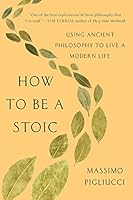
## Metadata
- Author: [[Massimo Pigliucci]]
- Full Title: How to Be a Stoic
- Category: #books
## Highlights
- I am by profession a scientist and philosopher, and I have therefore always been inclined to seek more coherent ways to understand the world (through science) and better choices for living my life (through philosophy). ([Location 90](https://readwise.io/to_kindle?action=open&asin=B01K3WN1BY&location=90))
- The Stoics used several metaphors to get their point across. One of the most incisive is that of a garden, introduced by Chrysippus, who said that the fruits of the garden represent the ethics. To get good fruits we must nurture the plants with fine nutrients: the soil of the garden, then, is the physics, providing our understanding of the world in which we live. Moreover, our “garden” needs to be fenced off from unwanted and destructive influences, or it will be taken over by weeds and nothing good will grow in it: the fence is the logic, keeping bad reasoning out of the way. ([Location 310](https://readwise.io/to_kindle?action=open&asin=B01K3WN1BY&location=310))
- The difference between Aristotle and the Stoics may seem subtle, but it is crucial: Aristotle thought that contemplation is the highest purpose of human life, because our unique function in the animal world is our ability to think. As you might imagine, this purpose might make for a rather insular existence, so the Stoics shifted the emphasis very much toward the social, essentially arguing that the point of life for human beings is to use reason to build the best society that it is humanly possible to build. ([Location 578](https://readwise.io/to_kindle?action=open&asin=B01K3WN1BY&location=578))
- contra to the standard vegetarian argument, it is not at all easy to calculate just how many animals suffer and die when you take up a vegetarian diet, because large-scale cultivation of plant species for human consumption radically alters the environment of the planet, depriving a number of wild animal species of vital ecological space. If you think that eating local and organic is sustainable, you may be in for a surprise when you look at the relevant literature or do a bit of back-of-the-envelope calculation. ([Location 809](https://readwise.io/to_kindle?action=open&asin=B01K3WN1BY&location=809))
- The Stoics, as we have seen, held a developmental model of morality, thinking that we naturally come equipped with the ability to have regard not just for ourselves but also for our caretakers and other people with whom we come into regular contact early on in life. Once the age of reason arrives, however, when we are about seven or eight years old, we can begin to further build our virtuous character by two means: habit and (more so later in life) explicit philosophical reflection. ([Location 1476](https://readwise.io/to_kindle?action=open&asin=B01K3WN1BY&location=1476))
- “It’s just semantics” is a weird dismissal of sometimes necessary clarifications of language, because our ability to communicate with and understand each other depends on semantics—that is, on our accurate use of language. ([Location 2203](https://readwise.io/to_kindle?action=open&asin=B01K3WN1BY&location=2203))
- (Seneca, certainly a Stoic, used to help himself to the thoughts of the rival school of Epicurus, arguing that truth is the property of everyone, regardless of where it comes from, ([Location 2205](https://readwise.io/to_kindle?action=open&asin=B01K3WN1BY&location=2205))
- Aristotle distinguished among three types of friendship that I think still provide a useful framework today: friendship of utility, friendship of pleasure, and friendship of the good. ([Location 2211](https://readwise.io/to_kindle?action=open&asin=B01K3WN1BY&location=2211))